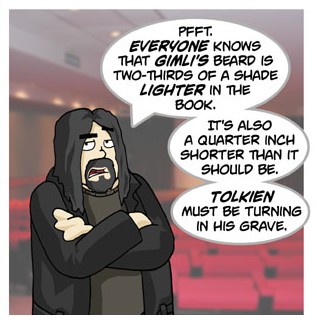As long as it is still the same basic story and keeps all the best bits and characters intact, then it doesn't matter too much that Bob's bald, Alice doesn't die, the football game ended with a different score, and they cut the watermelon scene, right? It's a bit of a shame they screwed that bit up, but really, it's not as if the entire work is
ruined forever, right?
WRONG! ...or so you would be told by many, many a fan. For some people, the very act of adaptation
is decay. A film version of something should be a direct word-for-word transcription, with utmost care that the sets, costumes and people be reproduced in every detail. If a character who wears a homburg in the original now wears a fedora, that will be enough to ruin the character, and therefore ruin the film. It will be all you will hear about from these fans on message boards, with them going on at length to explain how his homburg visually defined his entire personality in a way that a fedora never could. And don't you
dare suggest that in changing it they made it better. This trope is not only used in situations of
Adaptation Decay. It is also applicable to ongoing series where a significant change is made between seasons. See also
Translation Style Choices,
New Sound Album,
Replacement Scrappy,
Ruined FOREVER and
Network Decay. Contrast
Woolseyism. May overlap with
They Don't Make Them Like They Used To. On the opposite end of the spectrum is
It Is The Same Now It Sucks. When you have both
It Is The Same Now It Sucks and
They Changed It Now It Sucks, you wind up with an
Unpleasable Fanbase.
Note: This article lists examples which take place within fandoms of a work or series of works; not one's personal opinion as to whether a change is for the worse.



